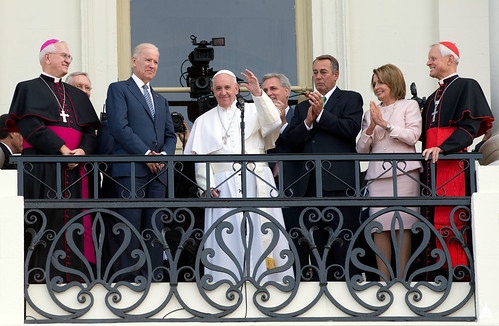Duluth, Minnesota (OpEdNews) March 25, 2021: Have you followed the Argentine Jesuit Pope Francis (born in 1936; elected pope in March 2013)? I have.
See, for example, my incisive OEN article profiling him as a doctrinal conservative titled "Pope Francis on Evil and Satan" (dated March 24, 2019):
But also see my more recent OEN article "An Open Letter to Pope Francis: Upgrade Your Thinking!" (dated March 1, 2021):
But are you ready now for a detailed chronicling of Pope Francis' well-reported papacy and its controversies? I am.
The seasoned English Vatican journalist John Cornwell (born in 1940) skillfully uses the words "disrupt" and "interrupt" and their cognate forms to structure his incisive and admirably accessible 300-page 2021 chronicle titled Church, Interrupted: Havoc & Hope: The Tender Revolt of Pope Francis (San Francisco: Chronicle Prism/ Chronicle Books).
Cornwell is a former Roman Catholic and a former seminarian (for about seven years -- from the age of thirteen onward; page xiv-xv).
One of the many admirable strengths of Cornwell's book is his practice of including sharply expressed criticisms of Pope Francis by certain contemporary conservative Catholics (e.g., R. R. Reno, George Weigel) as well as defenses by liberal Catholics (e.g., Massimo Faggioli, Austen Ivereigh).
Now in 1959, Pope John XXIII in 1959 called the decidedly disruptive Second Vatican Council (1962-1965) that decisively interrupted the centuries-old Roman Catholic Church formed by the epochal Council of Trent (1545-1563). Vatican II inaugurated a new epoch in Church history, an epoch that is still underway and still unfolding.
Because the bishops who voted at Vatican II were simultaneously backward-looking and forward-looking, perhaps we can use the image of the pagan god Janus to express their simultaneously backward-looking and forward-looking spirit, except that Roman Catholics tend not to invoke pagan gods, at least not favorably.
Now, on December 22, 2005, the now-former conservative Pope Benedict XVI had set up a decisive contrast between what he chose to refer to as a hermeneutic of discontinuity and rupture, on the one hand, and, on the other, a hermeneutic of reform and renewal in his controversial address to the Roman Curia. In it, the conservative pope advocates his so-called hermeneutic of reform and renewal as the proper conservative way of interpreting the sixteen documents of the Second Vatican Council, thereby rejecting his so-called hermeneutic of discontinuity and rupture as the mistaken liberal way of interpreting Vatican II.
According to the conservative Pope Benedict XVI, the proper conservative way to interpret the sixteen documents of Vatican II is not the hermeneutic of discontinuity and rupture. But Cornwell's structuring words "disrupt" and "interrupt" and their cognate forms sound like Pope Benedict XVI's term "rupture." Through Cornwell's repeated use of these words, he alerts hyper-vigilant conservative Catholics to Pope Francis' threats to their conservative way of thinking about their professed Catholicism.
Now-former conservative Pope Benedict XVI's address is reprinted in the 2012 book Vatican II: The [Six] Essential Texts, edited by the English Jesuit Norman Tanner (New York: Image Books/ Crown Publishing/ Random House, pages 3-13).
(Note: You can view every article as one long page if you sign up as an Advocate Member, or higher).





